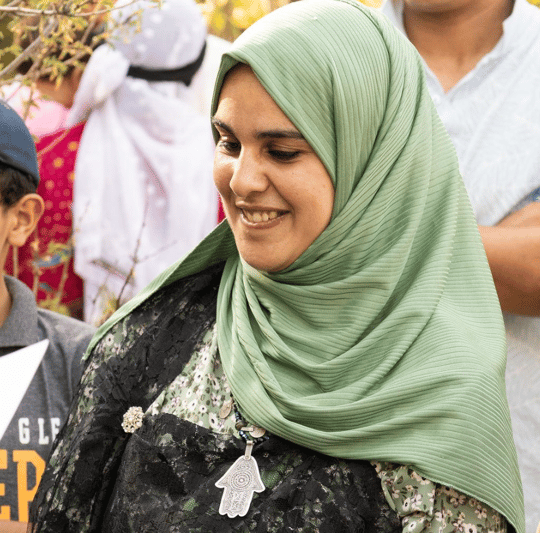Memories of the Jewish Community in Southern Morocco

World Interfaith Harmony Week
Glimpsing Memories of the Jewish Community in Southern Morocco: Hnni and Massa Fatma’s Family
Aguerd, Taroudant Province, Morocco
By Jamal Maghiouzi
Massa Fatma is Massa Rachida’s grandmother, and she is 80 years old. She was born in Aguerd village, and she moved to Irazane when she got married. She has been taking care of her mother since her father passed away. Other members of her family are based in Irazane and other nearby villages. Massa Fatma prefers to spend summer time with her relatives in Aguerd and Ighrem because of the cool weather; however, winter tends to be harsh there.
She vividly remembers King Mohammed V’s return from exile in Madagascar in November 1955, recalling the many actions he undertook to protect the Jewish community in Morocco. The conversation with Massa Fatma brought back memories of the departure of members of the Jewish community from Tahala n Idda Ousmlal and their brothers in Irazane, although King Mohammed V did not encourage or impose their leaving. In Irazane, Jewish people lived with their families and practiced their traditions and customs related to social celebrations, including newborn parties and wedding ceremonies. As for heritage sites, a synagogue remained under construction but was never completed. She also said that the Mellah of Irazane was big, but a major part of it was sold. The Jewish community built a wall around the cemetery to protect it when the river would flood, and they still visit it to this day. In addition, Massa Fatma heard about the Aghzu n Bahmu Jewish festival in Oulad Brhil that took place every year, which was attended by Muslim people as well.
Massa Fatma told her granddaughter, Massa Rachida, that Jewish people never missed the chance to exchange gifts with their local friends and families whenever there was a ceremony. Jewish women used to join such occasions, and they beautifully sang Tizrrarin (i.e., Amazigh poems and chants that are performed during social occasions like wedding ceremonies) and performed Agwal or Ahwash (i.e., local collective Amazigh dance and musical performance from the south of Morocco). She felt an immense joy watching their performances.
Massa Fatma recounted her encounters with some members of the Jewish community when they would frequently visit Ighrem for trading reasons. Her father was a well-known trader, and he lived in Aguerd village with his small family. He sold silver and fabrics, and he dealt with Jewish traders. He once sold an amount of silver to them, and they processed it, skillfully crafting from it necklaces of the Khmisa —the hand of Fatima that protects against the “evil eye.” Massa Fatma received one of them as a present from her father, and she later passed it on to Massa Rachida, her granddaughter.

Rachida wears the Khmissa necklace that was made by a Jewish craftsman and passed down from her grandmother, who received it as a gift from her father when she was a girl. Photo: Sammy Voit for HAF
“One night, a burglar broke into [my father’s] shop at Ighrem’s local market. He took what he wanted and left the candle, which set the place on fire. As a result, he lost the fabric and the silver in the shop. After that incident, he invited a Jewish tailor whose name was Hnni. He stayed with our family for two months or more, and he could save the fabric that wasn’t burnt. He skillfully crafted handmade clothes for women as well as furniture. I often watched him working, and I learned this craft from him. He was a lovely, cheerful man, and he spoke Tachelhit fluently,” Massa Fatma shared, speaking of her encounter with a member of the Jewish community in Aguerd, Taroudant province.
While hosting Hnni, Massa Rachida’s grandmother would make him unsalted bread and provided him with eggs, tea, butter, water, and the necessary utensils for him to prepare his food based on Jewish dietary laws. Massa Fatma watched Hnni as he prayed and recited verses. “As soon as he finished praying, he immediately went back to work. He used to wash his clothes and tidy his work space himself,” she added. Hnni moved to the city of Taroudant and lived there for years. A relative of Massa Fatma once met him there years later, and they were excited to exchange news about their respective families.
Massa Fatma remembers the names of the traders who regularly visited Ighrem. Ben Ijja, another friend of her father’s, sold him olives in exchange for dates and butter, which he resold in the weekly market of Lkhmis n Irazane. Ben Hyyun, a lorry truck owner, transported and delivered silver, olive oil, candles, and other everyday essentials. And the family of Ayt Ben Sthila, who were silversmiths, were not only traders that dealt with Massa Fatma’s father but were his close friends, too.
Apart from these friends, Massa Fatma also made mention of her father’s visits to Tahala n Ida Ousmlal to purchase products from other Jewish traders, as it was known as the main Jewish trading centre.
“My father’s story is a living example of how Muslims and members of the Jewish community in Morocco lived in harmony until they decided to leave,” Massa Fatma concluded. Indeed, Massa Fatma’s memories are among the many Moroccan Muslim-Jewish stories that should forever be treasured.
—
This article is part of a series of interviews that celebrates Interfaith Harmony Week (February 1-7, 2023) and have been facilitated by the USAID Dakira program, which is implemented by the High Atlas Foundation and its partners and aims to strengthen inter-religious and inter-ethnic solidarity through community efforts that preserve cultural heritage in Morocco.
The article was completed with the support of the United States Agency for International Development (USAID), and the High Atlas Foundation is solely responsible for its content, which does not necessarily reflect the views of USAID or the Government of the United States.